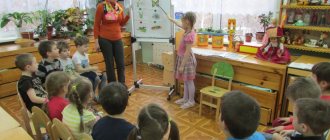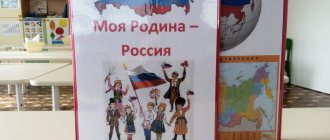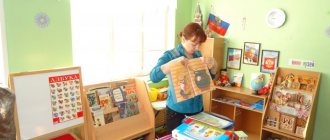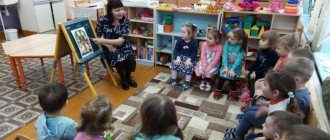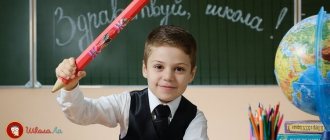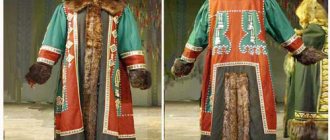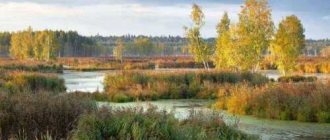Pedagogical project on patriotic education of preschool children “My Small Motherland”
Pedagogical project on patriotic education of preschool children “My Small Motherland”
Project participants: educators, parents, senior group students Project type: short-term
Problem: Familiarity with their native country, native village, the history of their native land, its attractions and famous people is of great importance for the cognitive, social, personal and moral development of preschool children. Parents have insufficient knowledge about their region, do not pay attention to this problem, considering it unimportant, children do not have sufficient information about their native land. Without sufficient knowledge, it is difficult to form a respectful attitude towards the small Motherland. Consequently, we consider this problem to be relevant not only for our kindergarten, but also for society as a whole.
Pedagogical project passport: Topic: “My small Motherland”
Project manager:__Anzhelika Grigorievna Kekhvaeva – middle group teacher.
Venue: MBDOU d\s No. 16 “Bell”
Features of the project: By the nature of the product: educational and research
By number of children: group.
Duration: short-term
By knowledge profile: all educational areas
“Love for the Motherland begins with family.” F. Bacon
Project goal: To introduce children to their native land and its attractions. Cultivate a sense of pride in your small Motherland, the desire to keep it clean and beautiful.
Project objectives:
1. Introduce children to their native land (history, sights). To introduce the names of those who founded and glorified, who fought for our Motherland during the Second World War.
2. Teach children how to navigate the city streets and follow the rules of safe movement around the city.
3. Expand children’s knowledge about the flora of the city of Pyatigorsk. To form an environmental culture in children and their parents, a desire to take part in environmental protection activities.
4. Cultivate interest and love for one’s hometown, region, the ability to see beauty and be proud of it.
Planned results and products of the project:
1. Children can know and name their place of residence: region, city.
2. Children can give their home address, the name of the kindergarten; experience love and affection for one’s home, family, kindergarten, and go to kindergarten with pleasure.
3. Children can know and name the place of work of their parents, the significance of their work; feel pride and respect for the work of adults; show attention and respect to veterans, the elderly, and provide all possible assistance.
The result of the children's activities: an exhibition of drawings and crafts dedicated to Victory Day in the Great Patriotic War, a holiday dedicated to this date.
Abstract: Activities are carried out in continuous educational activities, in joint activities of the teacher and children in the form of: conversations, leisure, observations of the nature of our region, reading fiction, guessing riddles, educational, educational, role-playing, outdoor games.
Stages of work on the project:
Stage I “Preparatory”
Stage II “Basic”
Stage III “Final”
Relevance of the topic: We are burning with the desire to cultivate love for the Motherland, but it turns out that we are not able to instill in a child love for what is closest to him - his home and kindergarten, but this is the basis of the foundations of moral and patriotic education, its first and most important stage. A preschooler must first recognize himself as a member of the family, an integral part of his small homeland, then as a citizen of Russia, and only then as an inhabitant of planet Earth. You need to go from near to far. The family is currently going through hard times. In an effort to earn their daily bread, parents pay less and less attention to their children and their upbringing, and the number of single-parent, disadvantaged families is growing. It is increasingly difficult for a child to love his home, family, and kindergarten too. Therefore, it is necessary to create conditions for the formation in children of an emotionally rich image of their home and kindergarten. Children must learn not only to take, but also to give: to take care of loved ones from childhood, to be attentive to each other.
Explanatory note
The problem of patriotic education of the younger generation is one of the most pressing today. The state program “Patriotic Education of Citizens of the Russian Federation” has been adopted, aimed at all social strata and age groups of Russian citizens. In this regard, the work of researchers and preschool educational institutions has noticeably intensified; scientific and practical conferences on the issues of patriotic education of children began to be held one after another. Within the framework of the Federal State Educational Standard for Preschool Education, for children of senior preschool age, the direction of civic-patriotic education is included in the educational area “Cognitive Development”.
Patriotism does not mean only love for one’s homeland. This is much more... This is the consciousness of one’s inalienability from one’s homeland and an integral experience with it of its happy and unhappy days.
Tolstoy A. N.
An older preschooler should be focused on:
1. Patriotism - love for your people, for your small homeland, service to the Fatherland;
2. Social solidarity – personal and national freedom, trust in people, institutions of the state and civil society, justice, mercy, honor, dignity;
3. Citizenship – service to the Fatherland, rule of law, civil society, law and order, multicultural world, freedom of conscience and religion. Thus, in relation to a child 6-7 years old, it is defined as the need to participate in all matters for the benefit of the family, kindergarten, native village, homeland, to feel like one of the representatives of living nature, to have such qualities as compassion, empathy, feeling self-esteem and to recognize oneself as part of the world around us.
Stages of work on the project:
Preparatory stage: 1.Creation of a subject-development environment in kindergarten.
2.Organization of walks, activities, games, conversations. Looking at drawings and photographs about your small homeland. Introduction to literary works. Use of games.
3. Increasing the competence of parents on issues related to patriotic education.
Main stage of work:
| Name of events | Subject |
| Working with GCD children | Speech development, cognitive development : Conversation “My Motherland - Russia” Conversation “History of the emergence of the city of Pyatigorsk” Examination of paintings by Stavropol artists. Productive activities : “My Street” – construction from building material “My Family” – drawing “My kindergarten” - drawing “Nature of our region” - application “This Victory Day” - paper construction Artistic and aesthetic development : (music) Listening to audio recordings: “If you go on a journey with a friend” "From a smile" "Russian anthem" "Go beyond the seas and oceans" |
| Games | Role-playing games : “Shop”, “Mail”, “Home”, “Mothers and Daughters” Board games : Lotto “Folk Crafts”, educational game “Fauna of our region”, educational game “Inhabitants of Planet Earth”, dominoes “Folk Crafts” Outdoor games : “Train”, “Be careful”, “Birds and a car”, “Fast rockets are waiting for us”. Didactic games : “Coat of arms of the city”, “Name the streets of our village”, “Flag of Russia”, “Tell me where you live” and others. |
| Introduction to literature | N. Nosov “Patch”, S. Mikhalkov “Uncle Styopa is a policeman, My street”, “My grandmother” S. Kaputikyan, “Don’t stop me from working”, “That’s how mom” E. Blaginina riddles, poems, proverbs. |
| Targeted walks, excursions | “To the Russian birch tree”, “To the monument to the soldiers who fell in the Second World War”, “School local history museum” |
| Working with parents | Questioning parents on the topic: "Patriotic education of a child" Consultation for parents on the topic: “Moral and patriotic education of preschool children” |
| Working with teachers | Selection of materials for creating a subject-development environment, didactic games, fiction. Consultation for educators: “Stages, forms and methods of patriotic education of preschool children” |
The final stage:
Final events: “Victory Salute” holiday Exhibition of drawings and crafts dedicated to Victory Day in the Great Patriotic War.
Project summary:
Involving the family in the patriotic education of children requires special tact, attention and sensitivity from the teacher to each child. The voluntary participation of everyone is a mandatory requirement and condition of this project.
The central role in civil society is occupied by the individual citizen. The family plays a key role, since it is the family that performs a number of functions related to the needs of the individual and society: reproductive, educational, economic, spiritual and emotional, and many others.
The formation of patriotic feelings is more effective if you establish a close connection with your family. The position of the parents is the basis for the family education of the child. From an early age, a child can feel involved in the life of his people, feel like a son or daughter not only of his parents, but of the entire Fatherland. This feeling should arise even before the child understands the concepts of “homeland,” “state,” and “society.”
In addition, patriotic education forms in a future person love for other people, teaches him to help people, and cultivates nobility in a person. Therefore, today the primary task of all teachers is to instill in children a love for their homeland, for their city, for their family and friends, to teach them to help each other, in general, to raise a real worthy person - a citizen of the Russian Federation.
The result of the project
The results achieved allow us to conclude that as a result of the activities that were carried out, a positive result was obtained.
* A subject-spatial development environment (DSDE) has been created.
* Developed advisory and practical material for parents and teachers on this topic.
* Children began to show a pronounced interest in the sights of the city, region, and symbols of the country.
* A sense of pride in one’s country, the “small Motherland” has developed.
* The project made it possible to:
- realize the creative potential of not only children, but also their parents,
-attract the attention of adults and children to interesting social phenomena,
- strives to explore natural objects,
* In the process of working on the project, parents, children, and the teacher became one team. Parents began to actively participate in all activities held in kindergarten.
3
Short-term project “My Small Motherland” for the senior preschool group of the kindergarten
Lyubov Snoring
Short-term project “My Small Motherland” for the senior preschool group of the kindergarten
Duration: short-term (09/15/2014 - 09/29/2014)
Type of project: informational - creative.
Project participants: children, parents, teacher.
Children's age: 5-6 years.
Relevance: In pedagogical science, patriotic education has been and remains one of the most important areas. But the formation of patriotic consciousness is a long process that can be carried out throughout a person’s life. Preschool childhood can rightfully be considered the beginning of the formation of a person’s patriotic orientation.
Patriotic feelings are formed in the process of life and existence of a person located within a specific sociocultural environment. From the moment of birth, people instinctively, naturally and imperceptibly get used to their environment, nature, culture and way of life of their people.
A small child’s love for the Motherland begins with the relationship with the closest people - father, mother, grandmother, grandfather, with love for his nature, for home, for the street on which he lives, for the city.
Watching the children, I saw that they were curiously looking at postcards and photographs about their hometown and sharing their impressions. But, talking with children, I became convinced that children have a superficial understanding of the history of their hometown, as well as rare plants.
Goal: implementing an integrated approach to the formation of spirituality, moral and patriotic feelings in preschool children, introducing preschoolers to the history and culture of their hometown, local attractions, nurturing love and affection for their native land.
Tasks:
1. Form initial ideas about your country, your city.
2. Introduce children to state symbols: flag, coat of arms, anthem
3. Introduce the history of your hometown, its monuments and architecture (modern and ancient creations).
4. To sow and cultivate in children's souls the seeds of love for their native nature, for their native city, for their native home;
5. Cultivate interest in visiting cultural sites of the city.
6. Develop a caring attitude towards the city and its attractions,
cultural values, nature.
7. Arouse in children a sense of pride and interest in their city.
8. Encourage a desire to learn more about your hometown.
9. Bring to the understanding that our city requires careful treatment
to the historical heritage of our city.
10. Arouse desires to do something useful for your city of Isilkul.
11. Learning home addresses with children.
12. Develop basic research skills.
13. Develop children’s coherent speech; enrich and activate the vocabulary; memory, interest in gaming activities, creative and cognitive abilities, imagination.
Progress of work on the project.
Stage I: preparatory
1. A selection of materials, fiction on a given topic
2. Collection of illustrative material
3. Development of lesson notes
Stage II: main
Theory
Cognitive development
1. “My country Russia”
Goal: to develop in children of this age a sense of patriotism and respect for their homeland.
Objectives: familiarize children with such concepts as “Russia”, “Motherland”, “Fatherland”; overview of the symbols, the anthem of Russia and the capital; consolidation of received information
2. “Our hometown is Isilkul”
Goal: to develop in children of this age a sense of patriotism and respect for their small Motherland.
3. Conversation “My house, I’ll put it in order.”
Goal: To develop a culture of behavior in children, the desire to maintain cleanliness and order in the house, group, and area.
4. “Clean City” (ecology)
Goal: To clarify children’s knowledge about the importance of cleanliness of city streets and the role of a person in maintaining it.
Practice
Artistic and aesthetic development
1. Drawing: “The house where I live”
Goal: Activate thought processes
Objectives: To create conditions for reflecting in the drawing the idea of the place of residence as one of the “corners” of one’s homeland. Continue drawing simple plots. Develop creative imagination and compositional abilities. To foster patriotic feelings and interest in learning about one’s homeland
"Nature of the native land"
Goal: Activate thought processes
Objectives: Develop the ability to draw deciduous and coniferous trees, conveying the characteristic features of the structure of the trunk and crown (birch, oak, willow, aspen, spruce, colors; develop technical skills in drawing with pencils. Improve visual skills and develop the ability to create expressive images using various image media
"Administration of Isilkul"
Goal: Activate thought processes
Objectives: Enrich the content of visual activities in accordance with the assigned tasks of cognitive development. Teach children to create stories based on a familiar building, combining visual techniques (drawing and appliqué). Encourage children to embody their ideas and aesthetic experiences in artistic form.
2. Origami “Trees”
Goal: Activate thought processes
Objectives: Develop self-confidence.
-Learn to follow verbal instructions and sequences of actions. Stimulate the development of memory, including muscle memory.
-Introduce in practice basic geometric concepts.
-Learn to concentrate.
-Develop spatial imagination, visual perception of information.
3. Music listening to the anthem of the Russian Federation, songs about your hometown
Goal: to introduce students to the Russian anthem in a historical retrospective, their hometown.
Tasks:
— Development of interest in the history of Russia, hometown;
— Formation of respect for the symbols of the state;
— Expanding students’ horizons about the state symbols of Russia;
— Development of skills in performing the anthem;
— Education of civic feelings, feelings of patriotism through knowledge of the symbols of the state
Joint activities of parents and children:
1. Making a model of individual buildings in Isilkul.
Goal: To develop visual and effective thinking, to stimulate the search for new ways to solve practical problems by making various models, mastering the technique and skills of three-dimensional modeling, acquiring skills in working with paper, cardboard and using various available materials; development of spatial thinking.
Tasks:
— Support children’s desire to actively engage in communication and speak out;
— Develop children’s search activity, the ability to plan the stages of their actions, and justify their choice;
— Give children the opportunity to show their design and creative abilities;
— Improve the style of partnerships.
2. Improvement of the territory of the kindergarten.
Goal: creating emotionally favorable conditions for children to stay in a preschool institution through landscaping the territory and organizing the kindergarten ecosystem.
Tasks:
— Cleaning the territory of the preschool educational institution.
— Foster a caring attitude towards nature and the surrounding world.
1. Visit to the museum,
Goal: To familiarize preschoolers with the history of culture and art through an introduction to the museum
Tasks:
— Deepen and systematize children’s knowledge about the culture of behavior in public places, including museums.
— Prepare children to perceive the world of a museum, namely: introduce them to what a museum is and what types of museums there are (first when demonstrating illustrations, slides in kindergarten, then when communicating with the originals during an excursion to the museum); with museum professions, with “non-museum” objects.
— To develop in children the skills of artistic perception of works of art.
2. Visit to the library of the Isilkul Central Library System
Goal: To introduce children to the library and the basic rules for using the library, to develop the skill of caring for books.
Tasks:
- Give the concepts: library, reader, librarian, form.
— Explain the procedure and rules for using the library.
— Introduce the rules for using the book.
Speech development
1. Reading fiction
(Berstov “We are driving around the city”, Mikhalkov “Street of our city”, poems about our small homeland, etc.)
Goal: developing interest and need for reading (perception) of books
Tasks:
— Formation of a holistic picture of the world, including primary value ideas;
— Development of literary speech;
— Introduction to verbal art, including the development of artistic perception and aesthetic taste.
2. Consideration of a famous person of our city (V. S. Grebennikov)
The goal is to meet a famous person in our city.
Social and communicative development
1. Finger gymnastics:
Goal: to introduce children to finger gymnastics, teach them how to play it, while developing speech and evoking an emotional response.
“We went for a walk in the yard,”
"House", "House",
"Journey",
"In the forest"
2. Didactic games:
"Assemble the mosaic"
Goal: development of motor dexterity of the index and thumb of the child’s dominant hand; developing the child’s ability to arrange a mosaic pattern in accordance with the pattern
“Guests of Isilkul?”
Goal: To develop the ability to creatively develop the plot of the game
3. Role-playing games:
"Shop"
Goal: to teach children to implement and develop the plot of the game; consolidate knowledge about the functioning of the store; develop skills of cultural behavior in public places.
"Library"
Goal: To increase interest and respect for the book; develop speech creativity during the game, fine motor skills; to form a culture of communication in the library among preschoolers.
"Construction of a new house"
Target. Improving preschoolers’ specific ideas about construction and its stages.
Stage III: final.
Conducted an analysis and summarized the results obtained during the project. The children noted that Isilkul is a very beautiful city. They also noted that there are architectural buildings, monuments, palaces of culture
The children concluded that our city needs to be kept clean and tidy so that not only we can be proud of it, but also visiting guests from other cities can admire it.
We designed an exhibition of drawings “The House in which I live”, “Nature of my native land” and a drawing with elements of the application “Administration of the city of Isilkul”, origami “Trees”.
Result:
• Enriched and systematized knowledge of children about the history of the city and its cultural values, the unique nature of the region. A steady interest in studying this topic has been formed.
• Increasing the competence of educators on the presented topic.
• Participation of families of pupils in the educational process.
• Developed methodological and didactic support for this section.
MAGAZINE Preschooler.RF
INTRODUCING CHILDREN TO THE SMALL HOMELAND IN KINDERGARTENON THE. Garkushova MBDOU kindergarten No. 27, teacher (Belgorod)
We know that the basic qualities of personality are formed in childhood. And the future and the fate of our country depend on what qualities we can instill and educate in children.
The love of a small child for the Motherland begins with the relationship with the closest people - father, mother, grandfather, grandmother, with love for his home, street, city. Therefore, it is necessary to start introducing children to their small Motherland from early childhood. The feeling of the Motherland begins with admiration for what children see. It is important to introduce children to the culture of their people, since turning to heritage fosters a sense of pride and respect for the land on which you live.
When starting work, I conducted a survey of the level of knowledge of children and the interest of parents on this topic. As a result, it was revealed that children have knowledge, but it is episodic in nature and requires generalization and systematization. Children do not know famous Belgorod residents. Parents do not take an active part in the life of the city - they do not attend city holidays and events. Considering these results, I concluded that it is necessary to convey to parents the significance and importance of patriotic education of children.
It is not easy for young children to imagine what the city is like as a whole. That's why I started getting acquainted with the city in our kindergarten. She gave us a tour of the kindergarten, told us what it was called and what street it was located on. She introduced me to various rooms, their purpose, and people’s work. To consolidate the knowledge gained on the excursion, we drew pictures on the topic: “Our favorite kindergarten . We designed an album in which we placed children's drawings and photographs. She suggested that at home we draw a plan for the child’s path from home to kindergarten. Everyone responded with pleasure.
To introduce the children to how our city came into being, I prepared a presentation in which I told how and where the city-fortress was built. She introduced me to the work of fellow countryman Igor Chernukhin. We memorized an excerpt from the poem “Bel-gorod” , in which he tells how people built the city by hand with axes.
Thus, knowing your history, you feel proud of the people and love your small Motherland even more.
To acquaint children with the sights of the city, she organized a number of excursions. Since the kindergarten is located not far from the park named after. Lenin, that’s where we went first. During the excursion, the children were told that the park is a place intended for recreation; it has beautiful alleys, attractions, and cafes. The children admired the beauty of the surrounding nature. We saw how much people had to work to create such beautiful flower beds and alleys. Remember the rules of behavior in nature.
She suggested that parents and their children visit the sights of the city and take a photo report of their walk. “Me and My Favorite City” appeared . On it, the guys saw and recognized familiar places. This is Cathedral Square, and the eternal flame, and the Shchepkin Drama Theater. The children shared their impressions with each other and argued about who had visited the best place in the city.
During the activities, close contact was established with parents. They were equal participants in the process. “My White City” was held , in which children and parents proved who knows their city better.
To consolidate the children’s knowledge about the nature of our native land, we went on an excursion to the local history museum, which is located in the central part of the city, on the street. Popova. The children got acquainted with the exhibition, which told about the animals and birds of our region. Looking at the collections of stones and herbariums, the children saw how rich our region is in flora and fauna.
A local history center has been created in the group. It includes the albums “My Family” , “My City” , “Our Kindergarten” , symbols of the city and Russia, fiction, children’s drawings about holidays, life at home and in kindergarten. Children can apply the knowledge gained on excursions and visiting museums in practice, working in the local history center. In this center, children are given the opportunity to work with a city map, draw, look at illustrations and books, and create models.
The kindergarten has a general local history center. It contains a model of a Russian hut with furniture and household items placed inside. Conducting excursions in the center, I introduce children to the purpose of various ancient objects, the life and traditions of the Russian people, and national holidays. Children begin to understand that people and things have their own history, they learn to respect the traditions and customs of their people, they develop respect for culture, and a willingness to understand and accept a value system.
The Great Patriotic War. Battle of Kursk. This historical event covered our region with unfading glory. Arc of Fire diorama on their day off with their children . In kindergarten, children enthusiastically described what they saw on the excursion. Most of all I remember the huge canvas and the battle on the tank field; we decided to make a mini-museum in our group “Tank Battle on the Prokhorovsky Field” . Parents printed a photograph of the canvas, children brought military equipment (tanks, planes, soldiers). Together with the children, we made a model of trenches, placed military equipment, thereby recreating the picture of the battle.
To celebrate Victory Day, she carried out work dedicated to the memory of veterans of the Great Patriotic War. “Memory Tape” stand . The material was selected by parents and children. Each child brought a photograph of his relative who defended our Motherland from enemies and talked about which front he fought on, what awards and orders he received. Listening to these stories, we came into contact with living history and turned the pages of memory. Children received knowledge about the Great Patriotic War, the defenders of the Fatherland and their exploits, about another page in the history of their native land. The work I have done contributes to the civic and moral development of the individual.
The “book center” is also working to familiarize people with their native land. I replenish and change educational books, illustrations, photographs. Albums about the nature of the region, its history. The Red Data Book of the Belgorod Region is also located here. Leafing through its pages, the child wonders what needs to be done to prevent rare plants and animals from disappearing.
In the process of this work, the children learned to see the beauty of the world around them, empathize with troubles, help loved ones, admire the beauty of their native land, and conscientiously and responsibly carry out the assigned task. I hope that I was able to lay in the children the foundation on which a new feeling will grow - a feeling of love for their Fatherland.
| Next > |
